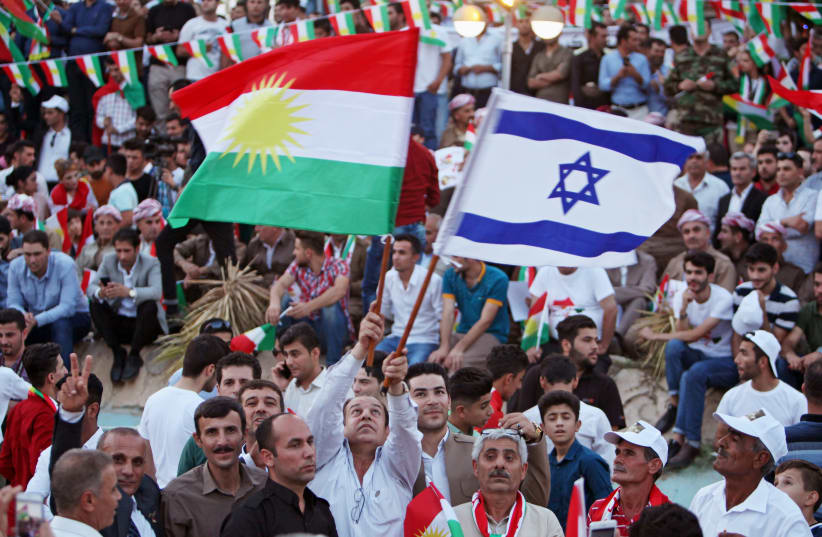The rallies are in response to an independence referendum planned by the Kurdistan Regional Government for September 25. Announced in June, the Kurdistan parliament in the autonomous region in northern Iraq approved it on September 15. Since September 5 the Kurdistan region and diaspora communities have been holding increasingly large rallies in support of the nation’s hopes for independence. This has been more than 100 years in the making, say many Kurds. The Kurdish people live in Turkey, Iran, Syria and Iraq, divided by the colonial borders set down after the fall of the Ottoman Empire. In Iraq they have enjoyed autonomy since the 1990s. After three years of war against ISIS the local government thinks it is time to show the world that the people want independence.The most beautiful thing in #Cologne_Festival for Independence of Kurdistan was raising #kurdistan_flag next to #Israel_flag pic.twitter.com/tlDZbHgMxa
— buhar derwish (@buhardar) August 26, 2017
The international community’s response has been tepid. On September 15 the White House released a statement saying the United States does not support the intention to hold a referendum. Other members of the international coalition fighting ISIS, who have been working with the Kurds and the Iraqi government, have also pressured the KRG to postpone. Israel is the only country to openly back Kurdish aspirations. “Israel supports the legitimate efforts of the Kurdish people to achieve their own state,” Prime Minister Benjamin Netanyahu’s office said on September 13. Speaking at the ICT’s World Counter-Terrorism summit on September 11, Justice Minister Ayelet Shaked said, “Israel and countries in the West have a major interest in the establishment of the state of Kurdistan.”From yesterday's historic Kurdish independence festival in Köln.The beautiful Israeli flags are everywhere along Kurdish flags.Biji Israel pic.twitter.com/iW5PgFepaz
— Mardini (@MardiniAlan3) August 27, 2017
In the Kurdistan region, Israeli flags have also been brought to Akre, Dohuk and Erbil rallies. Tens of thousands have attended these events. At no other rallies in the Middle East outside of Israel are Israeli flags present. In Egypt a recent controversy even erupted over the image of an Israeli flag in a textbook. In Iran the only Israeli flags on display are when they are being burned or trampled. Even across Europe and the West, Israeli flags are often a point of controversy, banned from events or the recipient of ire at anti-Israel protests.People attend a demonstration in support of the referendum for independence of Kurdish Iraq in Geneva, Switzerland. (VCG/Pierre Albouy) pic.twitter.com/yeCx6Fs74k
— Global Times (@globaltimesnews) September 11, 2017
Kurds, however, have a long history of connections to Israel, both when Jews lived in Kurdistan before the foundation of Israel and after, when Israel sent clandestine assistance to Kurds resisting Iraqi oppression. In recent years Israeli politicians have increasingly expressed open support for Kurds. In conversations I’ve had with Kurdish soldiers, politicians and locals, they generally see Israel and their people as facing the same enemies, whether it is Saddam Hussein’s genocide in the 1980s or Islamist extremism such as ISIS more recently. Today Iran and its Shia militias across the region threaten Kurds and Israel.Today in #Oslo #Norway Kurdish people celebrated #Kurdistan Independence Day coming 25 of September ❤️☀️ pic.twitter.com/6aDsQpD6gG
— #Yes4Kurdistan ☀️ (@Parvanamedian) September 9, 2017
The Iraqi central government in Baghdad has opposed the referendum and threatened the Kurdish region with repercussions if it goes ahead.Happening Now: Large crowds gather in Erbil in support of the historic #KurdistanReferendum. #TwitterKurds pic.twitter.com/2JdFaNvwGq
— Kurdistan24 English (@K24English) September 16, 2017
Masoud Barzani, the president of the KRG, has said the referendum will not be postponed and that “dialogue with Baghdad will resume after the referendum.” The pro-referendum Kurdish leadership has stressed that the referendum is a natural right.The only non-Kurdish flag at rally going on now in #Erbil. Israel the sole country to support independence referendum pic.twitter.com/MMGxTsOrLN
— jane arraf (@janearraf) September 16, 2017
As the referendum date nears, there is a growing presence of Israeli flags and a feeling that the West has not stood by Kurdish democratic desires and demands for the same freedoms and referendums that have been held in Western states such as the Scottish referendum or Brexit. So far the flags have not engendered much controversy. Historically in Arab nationalist circles, Kurdistan was accused of being a “second Israel.” Ofra Bengio noted in a 2014 article for Middle East Quarterly that as early as 1966 Iraqi defense minister Abd al-Aziz al-Uqayli used this accusation. Given the long history of accusations against Kurds, it seems the visibility of the Israeli flag represents the maturation of decades of cultivation of this unique relationship.An epic photo from Erbil, capital of the #Kurdistan Region of Iraq, taken today. #Israel pic.twitter.com/z8heLFKoXK
— Ceng Sagnic (@cngsgnc) September 16, 2017
A friend sent me this recent photo of a Taxi in #Kurdistan; part of numerous photos of Israel and Kurdish flags in popular culture pic.twitter.com/wT7pztePF1
— Voice Of The Kurds (@VoiceOfTheKurds) September 16, 2017
